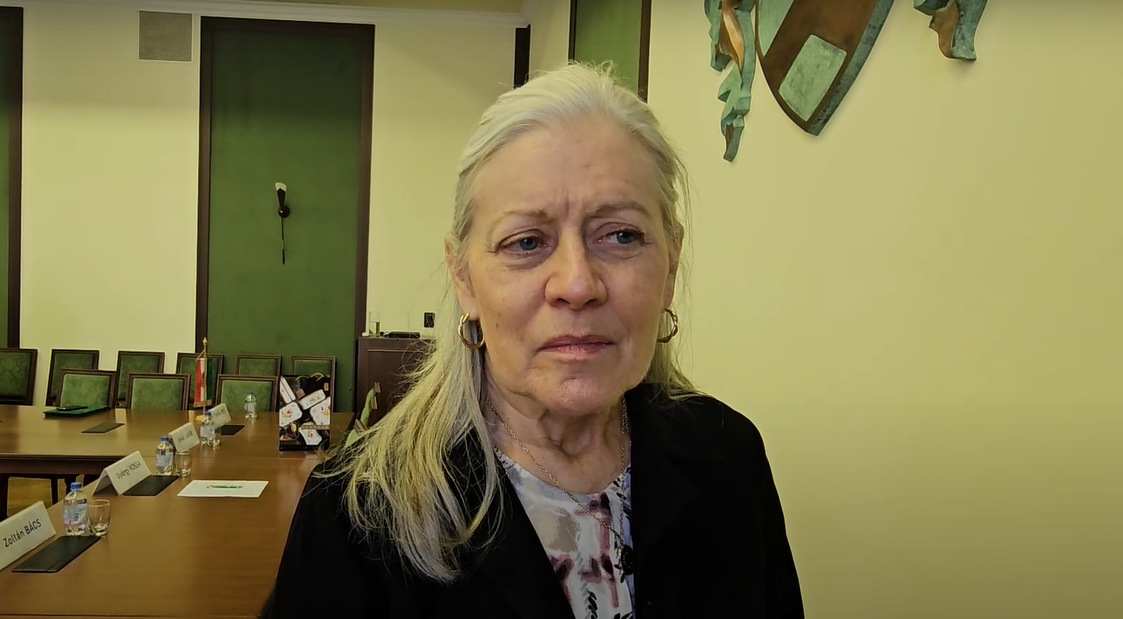On Tuesday, June 3, 2025, the University of Debrecen and the University of Central Florida signed a cooperation agreement in the Karácsony Sándor Hall of the DE Main Building. The partnership marks a significant step in fostering transatlantic collaboration in research, innovation, and education. As part of the event, Carol Ann Dykes Logue from UCF shared insights on building thriving innovation ecosystems, emphasizing the importance of university-industry-government collaboration and the role of faculty in driving commercialization efforts.
Interviewer: What are the most critical elements for building a thriving innovation ecosystem in a city?
Carol Ann Dykes Logue: Thank you for that question. Building an innovation ecosystem takes time and perseverance. The most important thing is that the key players in a city or metropolitan area — whether universities, companies, or government agencies — come together with a shared vision. It’s about creating a culture of communication, sharing information, and collaborating on initiatives like research, entrepreneurial education, or business support. Everyone has a role, and while they may compete in some areas, they are ultimately stronger together.
Interviewer: What lessons have you learned from working at the interface between universities, industry, and government?
Dykes Logue: That could be a long list! But some of the key lessons are that these three communities — academia, industry, and government — have very different missions and priorities. Industry wants to bring products to market and make money, while universities focus on research and education. Government has yet another set of goals. So, to build successful partnerships, you have to find common ground and be very clear about expectations, timelines, and outcomes. It’s all about building honest, transparent relationships and maintaining ongoing communication — just like in any successful collaboration.
Interviewer: How can universities become more effective in commercializing research and supporting faculty ventures?
Dykes Logue: I love this question. It starts within the university itself — faculty need to know they have permission to engage with industry and work on real-world problems. Not all faculty want to do that, and that’s fine, but you must support those who do. When companies engage with universities, they’re looking for innovation, yes — but also for access to students, their future workforce. Faculty who build strong industry relationships not only advance their research but also give their students valuable exposure.
Too often, universities make it unnecessarily hard for faculty to commercialize research or for companies to engage. That’s where things break down. A culture that encourages engagement and removes obstacles is essential.
Interviewer: What’s the process like for turning university research into successful products or startups?
Dykes Logue: It all begins with the faculty disclosing a potential innovation to the technology transfer office. That office must have skilled staff to coach the faculty, evaluate whether intellectual property protection is worth pursuing, and help identify potential industry partners. From there, it’s about verifying market need and forming partnerships — either for licensing or to support a startup.
It’s a process that requires strong internal communication and a clear understanding of how innovation moves forward. And importantly, commercialization can take multiple forms — not just licensing, but also spinouts or collaborations with entrepreneurs.
Interviewer: Out of 100 ideas, how many typically succeed in reaching the market?
Dykes Logue: Honestly, it’s a small number. Most innovations don’t make it because they’re not a significant enough improvement over what’s already available. That’s true in academia and in industry. But identifying which ones are truly viable is part of the journey.
Interviewer: Thank you very much for your insights.
Dykes Logue: Thank you.
(N. Nagy Sándor)

















